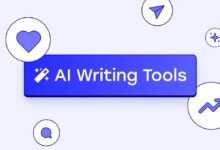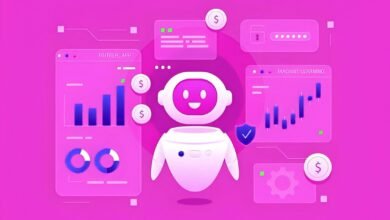Top AI Job Opportunities in the UK: Where to Start in 2025
Whether you're a graduate, a career switcher, or an experienced tech professional, understanding the AI job market in 2025 can set you on a promising path.

The artificial intelligence (AI) revolution is well underway, and the United Kingdom stands at the forefront of this technological evolution. With the UK government investing billions in AI research and innovation and companies across sectors racing to harness its potential, there has never been a better time to explore AI job opportunities in the UK. Whether you’re a graduate, a career switcher, or an experienced tech professional, understanding the AI job market in 2025 can set you on a promising path. In this article, we explore the top AI job roles, required skills, and where to begin your journey in this dynamic field.
1. Why the UK is a Global AI Powerhouse
The UK has emerged as one of the global leaders in AI development and adoption. With strong academic institutions such as Oxford, Cambridge, and Imperial College London; a robust tech startup ecosystem; and government-backed initiatives like the Alan Turing Institute, the country is well-positioned to lead in AI innovation.
London, in particular, is considered Europe’s AI capital, with a high density of AI startups and scale-ups. Cities like Edinburgh, Manchester, and Bristol are also making significant strides, offering fertile ground for AI professionals.
2. Top AI Job Opportunities in the UK for 2025
Here are some of the most in-demand AI roles expected to dominate the UK job market in 2025:
a. Machine Learning Engineer Machine learning (ML) engineers are at the core of AI projects. They build and optimize algorithms that allow machines to learn from data. ML engineers work closely with data scientists and software engineers to deploy models in production.
Key Skills: Python, TensorFlow, PyTorch, data modeling, statistics, cloud platforms (AWS, GCP, Azure)
Industries hiring: Finance, healthcare, e-commerce, automotive, cybersecurity
b. Data Scientist Data scientists analyze vast datasets to extract actionable insights. They develop predictive models and work on natural language processing, computer vision, and more. Their role is crucial in AI decision-making frameworks.
Key Skills: R, Python, SQL, machine learning, data visualization, statistical analysis
Industries hiring: Retail, pharmaceuticals, energy, public sector, education
c. AI Research Scientist AI research scientists work on theoretical and applied research to advance AI capabilities. Often employed by top tech firms or research institutions, they contribute to developing novel AI models and architectures.
Key Skills: Deep learning, mathematics, computer science theory, academic research, publications
Industries hiring: Academia, R&D departments, defense, robotics firms
d. Robotics Engineer As automation increases, robotics engineering is experiencing rapid growth. These professionals design, build, and program intelligent robots for manufacturing, logistics, and healthcare.
Key Skills: Mechatronics, C/C++, ROS, machine learning, embedded systems
Industries hiring: Manufacturing, aerospace, logistics, healthcare
e. AI Product Manager AI product managers bridge the gap between technical teams and business stakeholders. They define the product vision, manage timelines, and ensure that AI solutions align with business goals.
Key Skills: Product lifecycle management, market research, agile methodologies, AI fundamentals
Industries hiring: Tech startups, SaaS companies, finance, media
f. NLP Engineer (Natural Language Processing) NLP engineers specialize in enabling machines to understand and interact in human language. Their work powers chatbots, voice assistants, translation tools, and sentiment analysis platforms.
Key Skills: Linguistics, Python, transformers (BERT, GPT), text processing, deep learning
Industries hiring: Customer service, healthcare, law, marketing
3. Key Skills and Certifications to Succeed in AI Careers
To land high-demand AI job opportunities in the UK, candidates must acquire a mix of technical expertise and soft skills. In 2025, recruiters are particularly seeking candidates with the following credentials:
- Programming Proficiency: Python remains the dominant language in AI, but R, Java, and C++ are also valuable.
- Mathematics and Statistics: A strong grasp of linear algebra, calculus, probability, and statistics is essential.
- Deep Learning Frameworks: Familiarity with TensorFlow, Keras, PyTorch, and Scikit-learn is crucial.
- Cloud Computing: Experience with platforms like AWS, Microsoft Azure, and Google Cloud enhances employability.
- Communication Skills: The ability to explain complex AI concepts to non-technical stakeholders is vital.
- Certifications: Consider courses like
- IBM AI Engineering on Coursera
- DeepLearning.AI Specialization
- Google Cloud AI Engineer certification
- Microsoft Azure AI Engineer Associate
Read More: Will AI Replace Jobs in the UK? The Truth About Automation
4. Entry Points: How to Start a Career in AI in the UK
Starting your AI career journey in the UK involves strategic planning and continuous learning. Here are some recommended steps:
a. Pursue Formal Education Many universities offer undergraduate and postgraduate programs in artificial intelligence, data science, and machine learning. Top institutions include
- University of Cambridge—MPhil in Machine Learning
- Imperial College London—MSc in Artificial Intelligence
- University of Edinburgh—BSc/MSc in AI and Informatics
b. Enroll in Online Courses Platforms like Coursera, edX, Udemy, and FutureLearn offer affordable and accessible AI learning paths. These courses often include hands-on projects that strengthen your portfolio.
c. Build a Strong Portfolio Create GitHub repositories showcasing your AI projects. Contributions to open-source projects or Kaggle competitions can significantly boost your visibility.
d. Gain Work Experience Apply for internships, apprenticeships, or entry-level roles in data science or software development. Experience with real-world data and AI pipelines is invaluable.
e. Network in the AI Community Attend AI-focused meetups, conferences, and webinars. Join forums like Reddit’s r/MachineLearning and LinkedIn groups, and participate in hackathons.
5. Industries Driving AI Job Growth in the UK
Understanding which sectors are fueling AI demand can guide your career direction. Some of the top industries hiring AI talent in 2025 include
- Finance: AI powers fraud detection, algorithmic trading, and customer personalization.
- Healthcare: From diagnostic imaging to drug discovery, AI is transforming patient care.
- Retail & E-commerce: Personalization engines, chatbots, and inventory optimization rely heavily on AI.
- Automotive: AI is central to autonomous driving systems and predictive maintenance.
- Cybersecurity: AI helps in threat detection, behavior analysis, and automated defense mechanisms.
- Media & Entertainment: AI curates content, powers recommendation systems, and creates virtual influencers.
6. Top Employers and AI Hubs in the UK
In 2025, these organizations and regions are expected to be major hubs for AI job opportunities in the UK:
Top Employers:
- DeepMind (London)
- BenevolentAI (London)
- Babylon Health (London)
- Graphcore (Bristol)
- Darktrace (Cambridge)
- NHS Digital (Leeds)
- Microsoft, Amazon, Google, IBM, and Meta (UK divisions)
AI Hubs:
- London: Startup and investment epicenter
- Cambridge: Academic and biotech innovation
- Manchester: Digital transformation and smart cities
- Edinburgh: AI ethics and academic research
- Bristol: Robotics and hardware AI
7. Future Outlook: AI Careers in the UK Beyond 2025
AI job opportunities in the UK are projected to grow exponentially beyond 2025. With evolving technologies like generative AI, edge computing, and quantum AI, new roles and specializations will emerge. The UK’s AI strategy emphasizes inclusivity, ethical use, and sustainability, suggesting long-term support and stability for AI professionals.
AI will not only create jobs but also redefine existing ones, making continuous learning essential. From AI ethicists to AI governance experts, the future will demand both technical prowess and interdisciplinary knowledge.
Conclusion
AI job opportunities in the UK are more abundant and diverse than ever before. Whether you’re technically inclined or looking to blend AI with business, healthcare, or the arts, there’s a role for you in this rapidly growing field. By equipping yourself with the right skills, staying updated with industry trends, and targeting the right sectors and locations, you can successfully launch or elevate your career in artificial intelligence in 2025.
Start today and become part of the UK’s AI-driven future.







